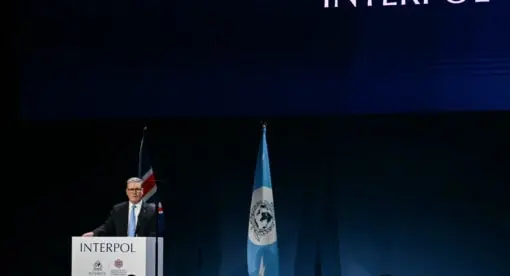In today’s episode of the Contours podcast, host Kelsey Quinn sits down with Middle East Affairs researcher Dr. Massaab Al-Aloosy. The pair discuss the domestic tensions within Israel over the war, the Israeli intelligence failure leading to Oct. 7th, and how Israel has attempted to change its defense strategy over time.
Kelsey Quinn:
Hello everyone and thank you for joining us for the New Lines Institute for Strategy and Policy Contours Podcast series. I’m your host for today, Kelsey Quinn, and I’ll be talking to Dr. Massaab Al-Aloosy about some less often discussed dimensions of the ongoing conflict in Gaza that began on Oct. 7, 2023.
Dr. Al-Aloosy is a researcher and academic who brings a whole wealth of knowledge and expertise in Middle Eastern affairs, security studies and conflict resolution. He has more than 15 years of experience and he has meticulously analyzed political, economic and social developments in the Middle East. As an academic, he has delivered exceptional instructional services and did groundbreaking research on Iran, regional security and socio-political complexities in the Middle East. As a journalist, he has provided insightful analysis on the Arab Spring and played a pivotal role in shaping public discourse on Iraqi politics and society. He is also the author of the book, “The Changing Ideology of Hezbollah,” which discusses how Hezbollah has evolved over the past four decades from a small terrorist organization to a formidable insurgency. He has published numerous academic papers on the group, dissecting Hezbollah’s operational and strategic objectives, regarding its relationship with Israel, Syria, Iran and more. Dr. Massaab, welcome to the show.
Dr. Massaab Al-Aloosy:
Thank you so much for having me, Kelsey. It is a great honor and a tremendous pleasure to be in the New Lines Institute’s podcast.
Kelsey Quinn:
Great. It’s wonderful to have you. So the first thing that I wanted to jump into is that the last time we actually discussed the Israel-Hamas war on this podcast was very shortly after the Oct. 7 attacks conducted by Hamas. It’s now more than seven months later, and although Hamas has taken significant losses, they still remain, and the Netanyahu government has not really given any reliable indication of de-escalating or even having a realistic day after plan, so to speak.
So the first thing that I’d like to address with you, Massaab, is the actual duration of the conflict between Israel and Hamas. Although the broader Israel-Palestine question has been a problem for decades and decades now, how is this specific iteration of the conflict unique from past escalation and how does it play into the entire historical and contextual narrative of Israel versus Palestine and Israel versus Hamas specifically?
Dr. Massaab Al-Aloosy:
Well indeed, the duration of the conflict is a very significant feature of the war between Hamas and Israel. Historically speaking, Israel’s military doctrine have relied mostly on short and decisive victories. Except for the War of Independence, Israeli Defense Forces manage to limit the duration of its wars and gain decisive wins.
For instance, in 1956, Israel, in coordination with France and England, attacked Egypt in what became known as the Suez Crisis. The war lasted from Oct. 29 till Nov. 7. In 1967, and within the span a few days, Israel defeated the militaries of Egypt, Syria, and Jordan and also occupied the Sinai Peninsula, the Golan Heights, the West Bank, the Gaza Strip, and East Jerusalem. As a result, Israel increased its territory by some estimates by four folds. Even when Israel was attacked, it managed to limit the war’s duration. When Syria and Egypt decided to attack Israel in 1973, the war lasted less than three weeks.
There are many reasons behind this military doctrine. For one thing, Israel’s population is much smaller in comparison to its adversaries. When Israel was under attack in 1973, its population was around 3.3 million. By contrast, Syria was almost 7 million, and Egypt was 37 million. In other words, Israel’s adversaries had more than 10 times the population, therefore it could not sustain a prolonged campaign stretching for years, similar to the Iran-Iraq War.
A high rate of casualties would also affect Israel’s domestic politics and possibly shift the social attitude towards war and the government. Israel’s democratic system does allow for social discontent either through demonstrations or changing the government through elections. A continuous war would also lead to calling the reserves and would shift the manpower from the economy to the war effort. Given Israel’s low population, the effects are even higher. The costs would also include munitions, production and changes in consumption.
Now, if we look at the current conflict, it already lasted more than seven months. The Israeli government is nowhere near achieving its goal of eradicating Hamas, but the cost is rising because of the duration of the war. For example, the Israeli army has called up more than 300,000 reservists, many of whom work in global tech companies and other types of businesses to join the fight, now of course. The absence of thousands of workers from their jobs due to the ongoing war with Hamas has been costing the Israeli economy an estimated $600 million a week, or about 6% of the weekly GDP, according to a research report released by the back of Israel. The Central Bank clarified that the calculation does not reflect the total damage and cost to the labor market and the economy resulting from a drop in demand and consumption during the war period. It does not include the cost of the many workers who were laid off and the absence of the Palestinian and foreign workers.
The cost of the war, I mean, is very high, despite the variance of estimates. Israel will spend between 50 and $60 billion on the economy and it is unlikely it will achieve its political objectives. In short, the continuation of the war does not serve Israel, does not serve the Palestinian population, but it is linked to the political career of the Israeli Prime Minister Benjamin Netanyahu because he will face grave repercussions after the war is over.
Kelsey Quinn:
Thanks Massaab. Yes, Netanyahu will certainly face significant repercussions once the war is over, particularly with the discussion of applications for arrest warrants from the ICC that were recently announced. And he also faces conflict within his own government with the more conservative contingent, not exactly agreeing with his approach and wanting it to be much, much more aggressive.
So now I’d like to look back a little bit and focus on something that perhaps Israel should have dedicated some more of those resources that they’re now expending on the war, prior to the initiation of this conflict, or the surround of conflicts, so to say, and that is the intelligence failures that happened around the Oct. 7 attack that really started this all off.
It was clear that there were significant failures of the Israeli intelligence system for this attack, which was actually known quite a bit before it occurred. Now that we have many months of hindsight on the conflict, can you speak more to the dynamics that led to Israel being apparently unprepared for October 7th and not taking the threat seriously? And if there have been any perceptible changes made since then, if the Israeli intelligence system and political system have learned any lessons or if those issues persist?
Dr. Massaab Al-Aloosy:
In terms of intelligence, there was clearly a gap that led to failure on preventing the attack on Oct. 7. The Israeli political leadership mostly focused on Hezbollah and Iran as they seemed as a bigger threat than Hamas. Hezbollah continued to increase its weapons stockpile since the beginning of the Syrian civil war and has proven to be a formidable adversary in other conflicts. And you look at the number of Israeli sorties over Syria to bomb many of the convoys heading to Lebanon is indicative of the tremendous amount of intelligence gathered on behalf of Israel.
As for Iran, the nuclear program was viewed as an existential threat to Israel, and it is natural that the policy makers prioritized gathering intelligence on Iran’s nuclear program and attempted to disrupt it. This is shown by the assassination of Iran’s nuclear scientists such as Mohsen Fakhrizadeh. Hamas was not even a priority at the time.
In addition, the gap between intel and the policymakers is not the first and possibly will not be the last in Israel’s history. Before the war against Israel in 1973, King Hussein of Jordan arrived in Israel along with his prime minister and intelligence chief. He met the Israeli Prime Minister Golda Meir, and warned her there is an imminent attack on Israel. Jordan’s general intelligence directorate had recruited a Syrian army divisions commander who had excellent access to Syrian war plans. But Israeli policymakers had their own biases, and in some instances, it is difficult to change their perception even when the evidence is very clear. This is what happened prior to the Oct. 7 terrorist attack. It is now clear that the Israeli intelligence obtained Hamas battle plan for the Oct. 7 attack more than a year before it happened and handed it to the policymakers. But Israeli officials dismissed the plan as aspirational and considered it too difficult for Hamas to carry out.
That belief was so ingrained in the Israeli government that they disregarded growing evidence to the contrary. It was a classic example of how intelligence agencies struggle in some instances to convince policymakers of a threat. But in this context, it is also important to remember that Hamas also exploited the gap between the Israeli intelligence community and the policymakers. Not only from Israel’s perspective, but also from Hamas’s, the Palestinian cause was shelved for many years and there was no progress on the political front. To the contrary, it seemed that the Palestine and Palestinians were receding as many Arab governments decided to sign peace deals with Israel, so the status quo seemed to resist them. A seed opportune for Hamas to conduct a military operation to remain relevant, and it relied on secrecy and cooperation with its partners, i.e. Hezbollah and Iran, to train its members for this attack.
It also created that clandestine network that was webbed throughout many years and in many countries, including countries such as Algeria, Qatar and even the United Kingdom. A senior Israeli security official admitted that Hamas practiced what he called a perfect deception exercise against Israel before its surprise attack. But the transition in Hamas’s approach is also linked to the transition within its leadership. Yahya Sinwar, who became Hamas leader in 2017, pushed for a more aggressive approach towards Israel. Years of being confined in Israeli prisons helped him acclimate his approach to the conflict with Israel, and he deliberately deceived the Egyptian intelligence, for example, through persistently stating that Hamas does not seek any conflict with Israel. This helped build up a specific perception and the mind of Israeli policymakers that made them doubt their own intelligence community.
Kelsey Quinn:
Thanks Massaab. Yeah, it seems they certainly dedicated most of the resources and their attention, both in the intelligence community and from policymakers, in other threats that Israel faces like Hezbollah and Iran. So you briefly mentioned Hezbollah there, which has been another adversary that Israel has had to contend with. So I’d like to transition a bit in discussing the number of other threats that the state of Israel faces.
Essentially, since its inception, Israel has had many, many adversaries in the region, and that very much remains the case today. However, one change that is noteworthy is one that most states in the last few decades have struggled with to varying degrees of success, and that’s the addition of pretty powerful non-state actors to the equation. Israel is uniquely affected by non-state actors as it faces threats from regional states, but also a swath of sometimes less predictable non-state actors. How do you assess the nature of this particular conflict between Israel and its many adversaries that it has to contend with today?
Dr. Massaab Al-Aloosy:
Well, for many decades, Israel was focused on state threats to its security. That started in 1948 when Britain terminated its mandate over Palestine and Egypt, Transjordan, Syria and expeditionary forces from Iraq entered Palestine. These forces took control of the Arab areas and attacked Israeli forces and several Jewish settlements. The 10 months of fighting took place mostly on the territory of the British Mandate and at the Sinai Peninsula in southern Lebanon, interrupted by several truce periods, o f course. But the war declared on Israel, as some Israeli historians admitted later, did not constitute an existential threat because of weaknesses and divisions in the Arab camp.
Again in 1956 Israel in coordination with Britain and France attacked Egypt. Nasser became closer to the Soviet Union, and Israel worried that he might build a strong army. The Egyptian leader had also taken some measures that were viewed as hostile from the Israeli perspective. Soon after the war commenced, Israel succeeded in destroying Egypt’s military capabilities, but was also forced to retreat to its borders. In 1967, the destruction was on a larger scale. Israel’s preemptive strike against three militaries proved the military superiority of Israel and its capability in fighting on many fronts simultaneously, and when it also continued to occupy the territories that it conquered during the conflict.
Once more in 1973, Israel succeeded in overturning a surprise attack with initial Egyptian and Syrian victories into a triumph. The Syrian army was distraught. Egypt eventually signed a peace deal with Israel. In all these conflicts, Israel faced organized armies with a command and a specific structure. The Arab dictatorships had built weak armies that relied mostly on quantity rather than quality. They were easily defeated by a savvier Israeli military technology and professionalism.
These adversaries, however, on a state level, were replaced by non-state armed groups as terrorist organizations and insurgencies. These groups honed their approach to the conflict with Israel over the years by learning from each other’s experiences. The rise of groups such as the Popular Front for the Liberation of Palestine and the Democratic Front for the Liberation of Palestine led to many terrorist attacks against Israel in the 1970s and the 1980s. Simultaneously, the PLO began attacking Israel from Southern Lebanon in a quasi-insurgency campaign. The secular and nationalist ideologically-based armed groups were supplanted by Islamist ones. For example, the PLO was replaced by Hezbollah in 1982, after the Israeli invasion. The PLO also began losing popularity for Hamas in the 1990s after signing a peace agreement with Israel.
Despite committing terrorist acts, Hamas and Hezbollah are more akin to insurgencies. They have social services, political parties, and of course, military wings. They represent a different challenge for Israel because they constitute a shift from symmetric to asymmetric warfare. As mentioned earlier, in a symmetric war, the targets are known such as tanks and airplanes, and the fight is usually in open fields. In asymmetric warfare, the fight is completely different. These groups hide among the population. They employ hit-and-run tactics, and they must have a strong connection with the population if they want to succeed.
I mean, bluntly put, Israel had been much less successful in fighting these groups in comparison to its wars against states. Israel’s ability to decimate the adversaries in a short time span is part of the past. Today, it is facing it’s growing threat by Hamas and Hezbollah. Looking at the fight with these groups from a holistic point of view, it becomes apparent that the threat to Israel is only growing without a remedy. Additionally, both are being backed by Iran and they’re gaining tremendous power because of that.
Kelsey Quinn:
Yes, absolutely. The Iranian backing is not something to scoff at, and that’s something we’ll definitely be discussing, you and I going forward, especially as we dive deeper into the enigma that is Hezbollah.
So let’s try and take a moment to combine all these different factors together, all of these threats of different natures that Israel is facing, and talk about Israel’s deterrence. Their deterrence calculus has always been quite complex, but dedicating so many resources to the effort of entirely eliminating Hamas, which is no small feat and perhaps impossible given its insurgent nature, can certainly impact that calculation. So in your assessment Massaab, how is the conflict between Israel and Hamas right now impacting Israel’s deterrence against other threats they face like Hezbollah, other Iranian proxies, and then Iran itself, as we saw from the very tense exchange of missiles that occurred between Israel and Iran, mid-April of this year?
Dr. Massaab Al-Aloosy:
It is clear now that Israel’s deterrence against its adversaries have been much less effective nowadays. Well, if we look at the basic purpose of deterrence, it is simply to discourage an action or an event by creating doubt or fear of the consequences in the adversary’s mind. This was the case between Israel and the regime in Syria, Egypt before it, as well as Jordan at some point. Israel has been more on the offensive rather than from the receiving end when it comes to war.
For example, in 1981, when Israel received intelligence that Iraq was building a nuclear reactor, it conducted this surgical strike and wiped it out. The same happened with Syria when in 2007, Israel destroyed a nuclear reactor being built in Deir ez-Zor. The same can be said of the numerous assassinations that Israel conducted, other military strikes and intelligence gathering. The purpose of these operations was to maintain Israel’s military edge and consolidate its deterrence.
But that is not so much the case today because the traditional tools of deterrence are not working. In contrast to the authoritarian regimes before, Hamas, and we can even include Hezbollah in this as well, are an expression of public frustration, and therefore, they are admired to a certain extent by their communities. Israel is facing an adversary so irredeemably hostile that it will always be looking for ways to attack, whatever the severity of the likely response of the Israeli response that is.
For example, Israel assassinated many of Hamas leaders throughout the years, including the assassination of Sheikh Ahmad Yassin, the founder of Hamas in 2004. But these assassinations and attacks against Hamas in the past 30 years have not deterred Hamas from conducting the Oct. 7 attack. Now, instead of deterring Hamas, Israel now wants to eliminate it as a political and military force. In other words, Israel has no interest in persuading Hamas not to attack again or deterring it. It wants to make sure that it never has the capacity to attack Israel.
Hamas have also been receiving steady support from Iran, which helped to grow capabilities that eroded Israel’s deterrence. Hezbollah, and the IRGC, which is part of Iran’s Armed forces have assisted Hamas for many years through training its fighters in urban fighting and Lebanon and other places. They also helped Hamas to improve his counterintelligence operation to limit Israel’s access to information. Hezbollah and the IRGC also sent weapons to Hamas and increased his military offensives. In other words, that support helped Hamas adapt to the Israeli methods and made it a bigger threat over the past few years. It also emboldened Hamas in its fight against Israel and led to its miscalculation of the Israeli response after Oct. 7.
While Israel seeks to restore deterrence by force, there are also other alternatives that it should explore. Hamas, from Israel’s perspective, is no longer a useful organization that controls an overpopulated hostile population. The only perceived option is to destroy Hamas. However, the post-conflict settlement presents an opportunity for Israel to restore its deterrence through engineering a political environment acceptable to the Palestinians. This would prevent its adversaries from taking advantage of the vacuum created in the Palestinian Territories and shift the attention to other matters such as Iran’s nuclear program. That however, requires a political will within the Israeli political establishment, which seems to be lacking.
Israeli politics have been in the process of shifting to the right for decades now, and deterrence is only viewed through the prism of force. It is also made difficult by the terrorist attack on Oct. 7 because the political establishment, as well as the society and Israel, of course, will be less convinced now that the way forward is peace with the Palestinians.
Kelsey Quinn:
Yes, that transition in the Israeli political system to further and further right has become a bit of an issue, particularly in trying to find a way to resolve the conflict in a way that doesn’t rely exclusively on force and the complete eradication of Hamas. And that can result in quite a number of casualties of innocent civilians.
So this first option of using force has not exactly gone over well in everyone’s perspective, and the public opinion has transitioned quite a bit from pre-Oct. 7, shortly thereafter. And then as this conflict continues to stretch on, there’s been a growing contingent of people that are denouncing the actions of Israel, and even within Israel, Netanyahu and his government are facing those more conservative, more right-leaning forces that want to take a more aggressive and more aggressive stance against Hamas, and those two things are at odds.
Where Israel is facing some political backlash from different actors and also just the global opinion, but internally, they’re facing backlash in the opposite direction in a domestic political context. So can you speak to what the general and various public thoughts are regarding the conflict before, after, and now, as we approach the eighth month of this conflict?
Dr. Massaab Al-Aloosy:
Traditionally, the public sympathy was mostly in the Middle East, North Africa region, towards the Palestinians. Since the creation of Israel in 1948, Arabs in particular associated with the Palestinians and supported the Palestinians through thick and thin. After the 2008 war, for example, between Hamas and Israel, there were many demonstrations in countries such as Lebanon, Syria and Jordan. The same happened after the 2009 war in which massive demonstrations took place, even reaching Muslim countries such as Indonesia. However, demonstrations have been less frequent and in some countries did not even take place after the current conflict began. The number of demonstrations in the Arab world had been less because there are many internal problems and they cannot pay attention to other conflicts in the region, whether it’s civil war, poverty or general abysmal conditions, many middle Easterners believe the war in Gaza is secondary.
Also, some countries in the region would like to distance themselves from the conflict because of their regional policy and their negative view of Hamas. On the other hand, demonstrations around the world took place in support of the Palestinians and against the war in Gaza, even in countries that have long harnessed sympathy towards Israel. Countries such as France, Germany, Ireland, Italy and Australia witnessed many demonstrations calling for an end to the war. Even in the U.S., we are seeing a shift in public perception. The protests in American universities were inconceivable a decade ago. In short, Israel is losing the war for public perception, and the longer the war lasts, the less support Israel will receive from the world.
For decades after its independence, Israel was viewed as the David facing the Arab Goliath. The roles have been reversed today. In Israel, on the global social level, is being increasingly viewed as the aggressor. There are mainly two reasons behind the increased sympathy for the Palestinians and declining in association with Israel. Sympathy for the Palestinian cause has increased around the world because of mass communication. Pictures and videos of Gazans have garnered tremendous amount of sympathy for the Palestinians.
Another reason behind the increased sympathy for the Palestinians is the increased activism of the Muslim population in the western world. And through that, they were able to gather more support for the Palestinians. Despite the numerous differences that the Muslim communities might have in regards to political issues, they have a uniform view of Palestine.
Kelsey Quinn:
Yeah, that’s a great point that you raised about how the public perception is changing. A major factor of that is our ability to communicate with people across the world and for these images and videos to be shared. Where now these types of conflicts and the very realities of them are much more tangible to an outside audience and an outside perspective, whereas before the ability to communicate in this manner, everything was a bit more disconnected.
So that moves us into discussing the U.S. policy and approach. Obviously, the U.S. political system is very susceptible to public opinion and its approach to the conflict has been quite contentious on both sides of the American political spectrum. Historically, the United States has always had quite a strong support of Israel and has provided them with, essentially, unconditional support.
While steadfast support still currently remains, President Biden has made a number of comments in regards to the action of the Israeli government and military that have been more critical than is typical and have even threatened to pause military aid temporarily. Aid already approved by Congress until certain humanitarian considerations and balances are made. President Biden and the Democratic Party have been receiving political backlash, again from both those who are advocating for more humanitarian support for Palestinians and a distancing of the U.S. from Israel, and on the other side, those who are shocked by any step back or criticism towards Israel.
Has the U.S. policy towards Israel so far been mostly beneficial or detrimental to resolving the conflict, and where do you see it going? Especially as we approach the U.S. presidential election that’s coming later in this year?
Dr. Massaab Al-Aloosy:
As you alluded to, a constant in U.S. foreign policy in the Middle East has been its alliance with Israel and the commitment to its security. For decades, the U.S. provided financial and military to Israel and vetoed U.N. resolutions that condemned Israel. President John F. Kennedy even coined the phrase, quote-unquote, special relationship in 1962, explaining that Washington’s ties to Israel were really comparable only to that which it has with Britain over a wide range of world affairs.
By 2013, the then Vice President Biden argued that the relationship with Israel is not only a standing moral commitment, it’s a strategic commitment. That commitment became more apparent after the Oct. 7 attack. The Secretary of State, Antony Blinken became a frequent visitor to Israel and offered U.S. support and sympathy. The Israeli conduct in the war, however, compelled the Biden administration to distance itself. Despite initial sympathies to Israel after the terrorist attack, the Biden administration became frustrated with the Israeli government and specifically the Israeli Prime Minister Benjamin Netanyahu.
The relationship between Biden and Netanyahu became increasingly tense because of the path the war is taking. Biden has grown increasingly frustrated behind the scenes with his Israeli counterpart, telling advisers and others that the prime minister is ignoring his advice and obstructing efforts to alleviate the humanitarian crisis in Gaza. The most recent is the negotiations in Egypt in which Hamas agreed to the cease-fire while Israel rejected it.
Biden has also been venting his annoyance in recent private conversations, some of them with campaign donors, over his inability to persuade Israel to change its military tactics in the Gaza Strip and he has named Netanyahu as the primary obstacle. He has said he is trying to get Israel to agree to a cease-fire, but Netanyahu is, quote-unquote, giving him hell and he is impossible to deal with.
Also, the war in Gaza is becoming increasingly important for Biden because of the upcoming presidential elections. Biden is very careful not to lose the votes of sympathizers with the Palestinian cause, and he’s trying desperately to end the war before the electorate cast their votes. So when the U.S. abstained from vetoing a U.N. resolution calling for a cease-fire in Gaza, Netanyahu canceled an official visit by a top Israeli delegation to Washington.
When the Biden administration refrained from shipping some offensive weapons to Tel Aviv, it was a rare, if not an unprecedented, move. The differences between Biden and Netanyahu are having a spillover effect on the approach of the Democratic Party as a whole. For instance, we see Senate majority leader Chuck Schumer, delivering an unprecedented public condemnation of Netanyahu, arguing that he has lost his way while also calling for new elections in Israel. Other senators, including Bernie Sanders urged President Biden to stop providing offensive weapons to Israel for the war against Hamas until it lists restrictions on U.S.-backed humanitarian aid going to Gaza.
Also, I would like to mention that there is a coalition of lawyers domestic, U.S. domestic, and abroad, including at least 20 that work in the Biden administration called, on President Joe Biden to halt military aid to Israel, saying that Israel’s actions in Gaza do not comply with and U.S. and international humanitarian law.
So if we look ahead, maybe we can pose a question like how will relations between the two countries be in the future? The U.S. approach, in my opinion, and this conflict could be attributed to differences between two administrations, not a strategic U.S. shift towards Israel. If, for example, Trump wins the next presidential election, then certainly their relationship with Israel will be much better than what it is now, regardless of who is Israel’s prime minister.
But there is also another issue at stake here, which is U.S. public perception. Americans do not view Israel as positively as they once did. Maybe just maybe in time this public attitude will have an effect on the political system, and by implication, influence U.S.-Israeli relations.
Kelsey Quinn:
Absolutely. At the end of the day, the U.S. politicians and the president himself are swayed by the general public opinion within the United States, and those who are advocating for a lessening of that very tight relationship between the U.S. and Israel are quite a loud contingent. And although they may not be the vast majority of U.S. voters, they’re quite loud and they’re making a lot of noise. So we’ll have to keep an eye on how the U.S.-Israel relationship are going to develop, either strengthen or perhaps weaken, or stay more or less status quo over the next coming months and as we have a potential administrative handover at the end of this political cycle. So there’s definitely more that we can discuss at a later date. Thank you for being here. I can’t wait to jump back on with you to discuss any developments that occur and particularly I’m hoping we can dive a bit more into Hezbollah’s role and the Iranian proxies that are all a part of this very complex dynamic that’s going on in the region right now.
Again, thank you Massaab for coming on today. This was a great conversation and I look forward to discussing more with you.
Dr. Massaab Al-Aloosy:
Thank you so much Kelsey. It was great discussing this topic with you, and thank you so much also for the great comments and the questions that you posed as well.
Kelsey Quinn:
Well, thank you everyone for listening. This has been the Contours podcast from the New Lines Institute for Strategy and Policy. Again, I’m your host Kelsey Quinn today, and this is Dr. Massaab Al-Aloosy. And you can visit our website at newlinesinstitute.org for more analysis on this topic and many others. Thank you and take care.






